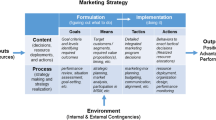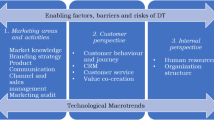Abstract
Retail is one of the sectors that Metaverse will strongly implicate. Given the hypothetical convergence of physical and the Metaverse shopping experiences, retailers in grocery segment must identify and forecast opportunities and emerging challenges to achieve a competitive advantage with appropriate marketing strategies. By anchoring in the brick-and-mortar context, the present paper discusses the sources of competitive advantage for grocery segment retailers in the Metaverse, highlighting differences and similarities with the traditional retail context. Moreover, following a marketing perspective, a research agenda is presented, looking at the retail sources of competitive advantage in the Metaverse.

Similar content being viewed by others
References
Alic, A., Agic, E., & Cinjarevic, M. (2017). The importance of store image and retail service quality in private brand image-building. Entrepreneurial Business and Economics Review, 5(1), 27. https://doi.org/10.15678/EBER.2017.050103
Ailawadi, K. L., Pauwels, K., & Steenkamp, J. B. E. (2008). Private-label use and store loyalty. Journal of Marketing, 72(6), 19–30. https://doi.org/10.1509/jmkg.72.6.19
Anaza, N. A., Bennett, D. H., Andonova, Y., & Anaza, E. (2022). DPS 2.0: On the road to a cashless society. Marketing Letters, 33(4), 693–704. https://doi.org/10.1007/s11002-021-09586-2
Arce-Urriza, M., & Cebollada, J. (2018). Assesing the success of private labels online: Differences across categories in the grocery industry. Electronic Commerce Research, 18, 719–753. https://doi.org/10.1007/s10660-017-9281-8
Barrera, K. G., & Shah, D. (2023). Marketing in the metaverse: Conceptual understanding, framework, and research agenda. Journal of Business Research, 155, 113420. https://doi.org/10.1016/j.jbusres.2022.08.051
Bauner, C., Jaenicke, E., Wang, E., & Wu, P. C. (2019). Couponing strategies in competition between a national brand and a private label product. Journal of Retailing, 95(1), 57–66. https://doi.org/10.1016/j.jretai.2018.11.001
Beck, N., & Rygl, D. (2015). Categorisation of multiple channel retailing in multi-, cross-, and omni-channel retailing for retailers and retailing. Journal of Retailing and Consumer Services, 27, 170–178. https://doi.org/10.1016/j.jretconser.2015.08.002
Belk, R., Humayun, M., & Brouard, M. (2022). Money, possessions, and ownership in the metaverse: NFTs, cryptocurrencies, Web3 and Wild Markets. Journal of Business Research, 153, 198–205. https://doi.org/10.1016/j.jbusres.2021.11.069
Björklund, M., & Forslund, H. (2014). The shades of green in retail chains’ logistics. In Sustainable logistics (Vol. 6, pp. 83–112). Emerald Group Publishing Limited.
Bloomberg Intelligence. (2021). Metaverse may be $800 Billion Market, Next Tech Platform. Bloomberg Intelligence December 1 https://www.bloomberg.com/professional/blog/metaverse-may-be-800-billion-market-next-tech-platform/. Last Accessed July 13, 2023.
Bratu, S., & Sabău, R. I. (2022). Digital commerce in the immersive metaverse environment: Cognitive analytics management, real-time purchasing data, and seamless connected shopping experiences. Linguistic & Philosophical Investigations.
Chakraborty, D., Kar, A. K., & Dennehy, D. (2023). Metaverse in e-commerce industry: current trends and future prospects. Electronic Commerce Research, 1–2 https://doi.org/10.1007/s10660-023-09754-w
Choi, S. C., & Coughlan, A. T. (2006). Private label positioning: Quality versus feature differentiation from the national brand. Journal of Retailing, 82(2), 79–93. https://doi.org/10.1016/j.jretai.2006.04.004
Colicev, A. (2023). How can non-fungible tokens bring value to brands. International Journal of Research in Marketing, 40(1), 30–37.
Day, G. S., & Wensley, R. (1988). Assessing advantage: A framework for diagnosing competitive superiority. Journal of Marketing, 52(2), 1–20. https://doi.org/10.1177/002224298805200201
Dawson, A. (2022). Data-driven consumer engagement, virtual immersive shopping experiences, and blockchain-based digital assets in the retail metaverse. Journal of Self-Governance and Management Economics, 10(2), 52–66.
Dunkin, A., Oneal, M., Phillips, S., Hamilton, J. O. C., & Welch, R. (1987). Power Retailers. Business Week, 21, 86–92.
Dwivedi, Y. K., Hughes, L., Wang, Y., Alalwan, A. A., Ahn, S. J., Balakrishnan, J., et al. (2023). Metaverse marketing: How the metaverse will shape the future of consumer research and practice. Psychology & Marketing, 40(4), 750–776. https://doi.org/10.1002/mar.21767
Fetscherin, M., & Lattemann, C. (2019). Artificial intelligence and the metaverse: Future management challenges in virtual worlds. Journal of Business Research, 97, 313–315. https://doi.org/10.1016/j.jbusres.2018.11.013
Gadalla, E., Keeling, K., & Abosag, I. (2013). Metaverse-retail service quality: A future framework for retail service quality in the 3D internet. Journal of Marketing Management, 29(13–14), 1493–1517. https://doi.org/10.1080/0267257X.2013.834678
Ferdous, M. S., Chowdhury, F., & Alassafi, M. O. (2019). In search of self-sovereign identity leveraging blockchain technology. IEEE Access, 7, 103059–103079. https://doi.org/10.1109/ACCESS.2019.2931173
Gauri, D. K., Jindal, R. P., Ratchford, B., Fox, E., Bhatnagar, A., Pandey, A., et al. (2021). Evolution of retail formats: Past, present, and future. Journal of Retailing, 97(1), 42–61. https://doi.org/10.1016/j.jretai.2020.10.005
Glynn, M. S., & Widjaja, T. (2015). Private label personality: Applying brand personality to private label brands. The International Review of Retail, Distribution and Consumer Research, 25(4), 362–378. https://doi.org/10.1080/09593969.2015.1051608
Ghirmai, S., Mebrahtom, D., Aloqaily, M., Guizani, M., & Debbah, M. (2023). Self-sovereign identity for trust and interoperability in the metaverse. Working paper, IEEE.
Habil, S. G. M., El-Deeb, S., & El-Bassiouny, N. (2023). The metaverse era: Leveraging augmented reality in the creation of novel customer experience. Management & Sustainability: An Arab Review. https://doi.org/10.1108/MSAR-10-2022-0051
Hoffman, D. L., Moreau, C. P., Stremersch, S., & Wedel, M. (2022). The rise of new technologies in marketing: A framework and outlook. Journal of Marketing, 86(1), 1–6. https://doi.org/10.1177/00222429211049854
Hollensen, S., Kotler, P., & Opresnik, M. O. (2023). Metaverse—The new marketing universe. Journal of Business Strategy, 44(3), 119–125. https://doi.org/10.1108/JBS-01-2022-0014
Homburg, C., Jozić, D., & Kuehnl, C. (2020). Customer experience management: Toward implementing an evolving marketing concept. Journal of the Academy of Marketing Science, 48(4), 630–649. https://doi.org/10.1007/s11747-019-00711-1
Huang, T. L., & Liao, S. (2015). A model of acceptance of augmented-reality interactive technology: The moderating role of cognitive innovativeness. Electronic Commerce Research, 15, 269–295.
Hübner, A. (2017). A decision support system for retail assortment planning. International Journal of Retail & Distribution Management. https://doi.org/10.1108/IJRDM-09-2015-0125
Jain, S., & Roy, P. K. (2022). E-commerce review sentiment score prediction considering misspelled words: A deep learning approach. Electronic Commerce Research. https://doi.org/10.1007/s10660-022-09582-4
Jena, S. K., & Meena, P. (2022). Competitive, sustainable processes and pricing decisions in omnichannel closed-up supply chains under different channel power structures. Journal of Retailing and Consumer Services, 69, 103114. https://doi.org/10.1016/j.jretconser.2022.103114
Jiang, Y., Liu, L., & Lim, A. (2020). Optimal pricing decisions for an omnichannel supply chain with retail service. International Transactions in Operational Research, 27(6), 2927–2948. https://doi.org/10.1111/itor.12615
Karray, S., & Sigué, S. P. (2021). Multichannel retailing and price competition. International Transactions in Operational Research, 28(4), 2002–2032. https://doi.org/10.1111/itor.12548
Kim, D. Y., Lee, H. K., & Chung, K. (2023). Avatar-mediated experience in the metaverse: The impact of avatar realism on the user-avatar relationship. Journal of Retailing and Consumer Services, 73, 103382. https://doi.org/10.1016/j.jretconser.2022.103382
Kraus, S., Kumar, S., Lim, W. M., Kaur, J., Sharma, A., & Schiavone, F. (2023). From moon landing to metaverse: Tracing the evolution of technological forecasting and social change. Technological Forecasting and Social Change. https://doi.org/10.1016/j.techfore.2022.122381
İpek, İ, Biçakcioğlu-Peynirci, N., & İlter, B. (2016). Private label usage and store loyalty: The moderating impact of shopping value. Journal of Retailing and Consumer Services, 31, 72–79. https://doi.org/10.1016/j.jretconser.2016.03.008
Lim, X. J., Cheah, J. H., Dwivedi, Y. K., & Richard, J. E. (2022). Does retail type matter? Consumer responses to channel integration in omnichannel retailing. Journal of Retailing and Consumer Services. https://doi.org/10.1016/j.jretconser.2022.102992
Lola, I., & Bakeev, M. (2023). What determines the differentiation in the e-commerce adoption by consumers: Evidence from Russia. Electronic Commerce Research, 23(2), 1143–1159.
MacInnis, D. J. (2011). A framework for conceptual contributions in marketing. Journal of Marketing, 75(4), 136–154. https://doi.org/10.1509/jmkg.75.4.136
Miller, C. M., Smith, S. A., McIntyre, S. H., & Achabal, D. D. (2010). Optimising and evaluating retail assortments for infrequently purchased products. Journal of Retailing, 86(2), 159–171. https://doi.org/10.1016/j.jretai.2010.04.004
Murad, A., & Smale, A. (2022). The retailers setting up shop in the metaverse. https://www.bbc.com/news/business-61979150. Last Accessed July 13, 2023.
Mladenović, D., Ismagilova, E., Filieri, R., & Dwivedi, Y. K. (2023). MetaWOM-toward a sensory word-of-mouth (WOM) in the metaverse. International Journal of Contemporary Hospitality Management, ahead-of-print.
Ning, H., Wang, H., Lin, Y., Wang, W., Dhelim, S., Farha, F., et al. (2023). A survey on the metaverse: The state-of-the-art, technologies, applications, and challenges. IEEE Internet of Things Journal. https://doi.org/10.1109/JIOT.2023.3068530
Pan, L. (2022). Luxury and the metaverse—Why luxury companies are exploring its potential. https://www.sdabocconi.it/en/news/22/10/luxury-and-the-metaverse--why-luxury-companies-are-exploring-its-potential. Accessed November 24, 2022.
Polyviou, A., & Pappas, I. O. (2022). Chasing metaverses: Reflecting on existing literature to understand the business value of metaverses. Information Systems Frontiers, 1–22. https://doi.org/10.1007/s10796-022-10364-4
Park, T. A., & Davis, E. E. (2011). Productivity and efficiency impacts of human resources practices in food retailing. Applied Economics, 43(30), 4689–4697. https://doi.org/10.1080/00036841003724417
Rauschnabel, P. A., Babin, B. J., & tom DieckKreyJung, M. C. N. T. (2022). What is augmented reality marketing? Its definition, complexity, and future. Journal of Business Research, 142, 1140–1150. https://doi.org/10.1016/j.jbusres.2021.11.070
Semeijn, J., Van Riel, A. C., & Ambrosini, A. B. (2004). Consumer evaluations of store brands: Effects of store image and product attributes. Journal of Retailing and Consumer Services, 11(4), 247–258. https://doi.org/10.1016/j.jretconser.2003.09.004
Sethuraman, R., Gázquez-Abad, J. C., & Martínez-López, F. J. (2022). The effect of retail assortment size on perceptions, choice, and sales: Review and research directions. Journal of Retailing. https://doi.org/10.1016/j.jretai.2022.05.004
Swilley, E. (2016). Moving virtual retail into reality: Examining metaverse and augmented reality in the online shopping experience. In Looking forward, looking back: Drawing on the past to shape the future of marketing (pp. 675–677). Springer. https://doi.org/10.1007/978-3-319-28134-8_193
Sommerauerová, D., Chocholáč, J., & Polák, M. (2018). Sustainable distribution logistics of retail chains. In Proceedings of the fourth international conference on traffic and transport engineering. Scientific Research Center Ltd.
Takashima, K., & Kim, C. (2020). The influence of conflict with suppliers on retailers’ private label performance. Journal of Asia Business Studies. https://doi.org/10.1108/JABS-01-2019-0002
Thaichon, P., & Quach, S. (2022). The growth of marketing research in artificial intelligence (AI). Artificial Intelligence for Marketing Management. https://doi.org/10.4018/978-1-7998-7575-8.ch006
Thanasuta, K., & Chiaravutthi, Y. (2018). Private-label branding and willingness to pay: Evidence from an auction experiment. The International Review of Retail, Distribution and Consumer Research, 28(3), 320–338. https://doi.org/10.1080/09593969.2017.1326662
Tomaštík, M., Jaderná, E., Víchová, K., & Habrová, M. (2019). New technologies in the retail logistics: Solution of risk situations. In 8th Carpathian Logistics Congress (CLC 2018). Tanger Ltd.
Van Hove, L. (2022). Consumer characteristics and e-grocery services: The primacy of the primary shopper. Electronic Commerce Research, 22(2), 241–266.
Verhoef, P. C., Kannan, P. K., & Inman, J. J. (2020). From multi-channel retailing to omni-channel retailing: Introduction to the special issue on multi-channel retailing. Journal of Retailing, 96(1), 1–5. https://doi.org/10.1016/j.jretai.2019.07.006
Yang, X., Cai, G. G., Chen, Y. J., & Yang, S. J. S. (2017). Competitive retailer strategies for new market research, entry and positioning decisions. Journal of Retailing, 93(2), 172–186. https://doi.org/10.1016/j.jretai.2017.04.005
Yoo, K., Welden, R., Hewett, K., & Haenlein, M. (2023). The merchants of meta: A research agenda to understand the future of retailing in the metaverse. Journal of Retailing. https://doi.org/10.1016/j.jretai.2022.08.003
Zallio, M., & Clarkson, P. J. (2022). Designing the metaverse: A study on inclusion, diversity, equity, accessibility and safety for digital immersive environments. Telematics and Informatics. https://doi.org/10.1016/j.tele.2022.101651
Author information
Authors and Affiliations
Corresponding author
Ethics declarations
Conflict of interest
On behalf of all authors, the corresponding author states that there is no conflict of interest.
Additional information
Publisher's Note
Springer Nature remains neutral with regard to jurisdictional claims in published maps and institutional affiliations.
Rights and permissions
Springer Nature or its licensor (e.g. a society or other partner) holds exclusive rights to this article under a publishing agreement with the author(s) or other rightsholder(s); author self-archiving of the accepted manuscript version of this article is solely governed by the terms of such publishing agreement and applicable law.
About this article
Cite this article
Bruni, R., Colamatteo, A. & Mladenović, D. How the metaverse influences marketing and competitive advantage of retailers: predictions and key marketing research priorities. Electron Commer Res (2023). https://doi.org/10.1007/s10660-023-09779-1
Accepted:
Published:
DOI: https://doi.org/10.1007/s10660-023-09779-1




